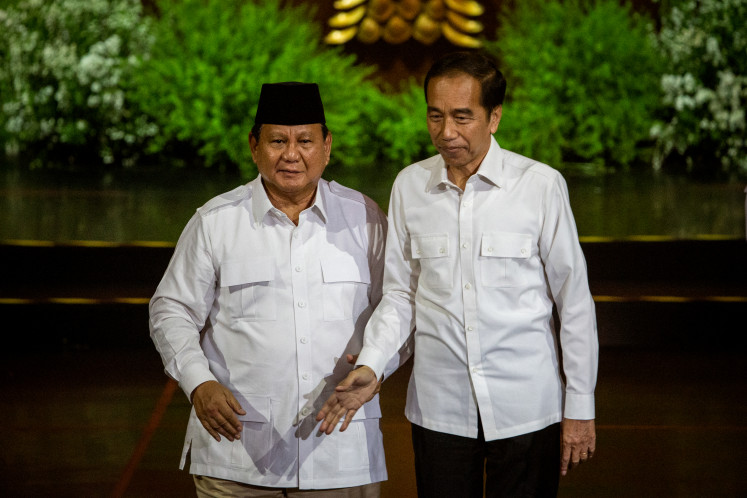Popular Reads
Top Results
Can't find what you're looking for?
View all search resultsPopular Reads
Top Results
Can't find what you're looking for?
View all search resultsIndonesians reaffirm faith in democracy
By and large, Indonesians should take pride that they have successfully gone through another important phase in strengthening democracy. They believed their votes matter.
Change text size
Gift Premium Articles
to Anyone
M
ost analysts have written off 2019 as a watershed year for Indonesia’s democracy, using the April general election to show that the nation is further backsliding on its commitment to democracy.
There are objective factors supporting their argument: The cycle of violence, polarization between supporters of the two presidential candidates, rising intolerance, increasing loss of freedoms for some and poor law enforcement.
With the naysayers having low expectations for the electoral process and for the new government’s ability to reverse these trends, Indonesia looks sure to be the next failing state, if not a failed state.
We can take comfort that we are not alone. Everywhere, democracy is suffering, including India and the United States, the only democracies larger than ours. Indonesia appears to be caught in this global trend and no one can say if and when this can be reversed.
But as we end the year, I beg to differ with this gloom and doom view on Indonesia.
The year 2019 has indeed been a watershed year for Indonesia, but more as the year that Indonesians, the big majority of them anyway, reaffirmed their faith in democracy. As long as they continue to have this faith, they can and should be more optimistic about the new year.
On April 17, 158,012,506 Indonesians cast their votes — that’s nearly 83 percent of the 190,770,329 registered voters. One will be hard-pressed to find another democracy, where registration is compulsory but voting is voluntary, with a higher turnout. It even set a record for all the five democratic general elections Indonesia has held since it embarked on democracy in 1999.
The April election was billed as the world’s largest one-day election, with voters casting five ballots for the presidential, various national and local legislative elections. What’s rarely acknowledged is that more than 7.2 million volunteers, ordinary citizens, were recruited to help administer and count the votes at over 800,000 polling stations nationwide. I ran the polling station in my neighborhood, too.
Few people recognize that this type of volunteerism, unique if not rare in the world, has helped shape democracy in Indonesia.
The more than 600 volunteers who died of exhaustion after running the polling stations — everyone typically put in more than 20 hours of work on the day — should be recognized as the 2019 men and women of the year, because they died in the service of the nation’s democracy. They are the unsung heroes of Indonesia’s democracy.
The 2019 election and the preceding six-month-long campaigns went relatively smoothly and orderly. There was little reported violence, even when including the major incidents that took place in Jakarta a month after the vote over a dispute about the results.
By and large, Indonesians should take pride that they have successfully gone through another important phase in strengthening democracy. They believed their votes matter.
Many voters, including supporters of the winning candidates and parties, are disappointed that things aren’t going their way, but that’s what democracy is all about: There are losers and winners, and there are bound to be disappointments. But these are lessons voters will take to the next elections.
Yet here is another equally important aspect of democracy that is often forgotten: People’s active participation in between elections. Their voice is what would keep elected leaders and representatives on their toes and accountable to voters.
Granted, freedom of speech is among many freedoms in danger in the current political climate, but that is all the more reason for people to take a more active stance instead of sitting back and accepting their fate as given.
They have many tools at their disposal now with the internet and social media to make their voices heard. They still have the option to take to the streets as a last resort, as Papuans showed in large numbers in several Papuan towns in August, and as students in Jakarta did in September.
Indonesia’s democracy is far from perfect, but it is still a functioning one. Elected leaders and representatives respond to pressure or risk the public’s wrath or their chances in the next elections.
In a democracy, things don’t always go your way. You can moan and lament about the loss of freedoms and democracy, making the naysayers’s analysis a self-fulfilling prophecy. Or you can organize yourselves and raise your voices to be heard.
There is so much work in 2020 and in the coming years that we can hardly sit still: Stop the plan to pass a Criminal Code bill that would take our freedoms away, the freedom and dignity of the Papuans, the faltering antigraft campaign, the plan to amend the Constitution and fixing the electoral system before 2024.
The last thing we want is to join the naysayers in ending 2019 with so much pessimism.
We should not sell ourselves short. If we have faith in democracy, as we showed in April, we should have faith enough that democracy is the best solution to many of our problems. And we should act on this faith.










